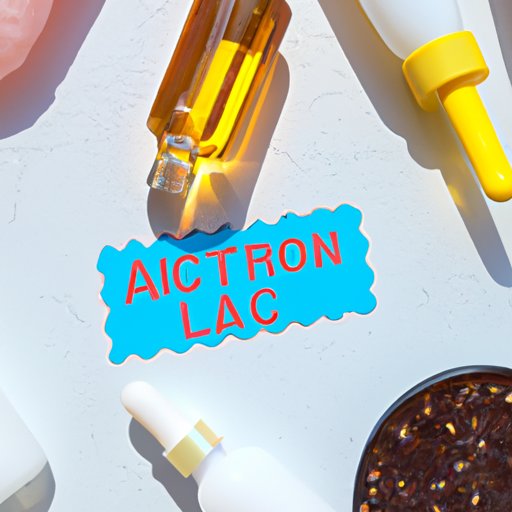Introduction
Acne is a very common skin condition that affects an estimated 85% of people worldwide. While most cases are mild, some can be more severe and lead to scarring. The good news is that there are ways to reduce or even eliminate acne scars. In this article, we’ll explore the science behind acne scarring and provide natural solutions and laser treatments to help reduce or fade them.
Exploring the Science Behind Acne Scarring: Can Acne Scars Really Go Away?
Acne scarring occurs when the skin is damaged due to inflammation caused by the overproduction of sebum, an oily substance produced by the sebaceous glands. The inflammation causes the body to produce too much collagen, which results in the formation of raised bumps, pitted areas, and discoloration in the skin. So, can acne scars really go away? The answer is yes, but it depends on a few factors.
Causes of Acne Scarring
Acne scarring can occur for a number of reasons, including picking at blemishes, squeezing pimples, and using harsh products on the affected area. Additionally, genetics can play a role in how prone someone is to developing acne scars. People with darker skin tones are more likely to experience hyperpigmentation, which can make acne scars appear more pronounced.
Types of Acne Scarring
There are four main types of acne scars: ice pick, boxcar, rolling, and hypertrophic. Ice pick scars are narrow and deep, while boxcar scars are wider and shallower. Rolling scars are broader and have a wave-like appearance, while hypertrophic scars are raised and bumpy. Each type of scar has different treatment options, so it’s important to understand the different types and what treatment may be best for you.
Factors Affecting How Long it Takes for Acne Scars to Fade
The length of time it takes for acne scars to fade depends on several factors, including the type of scar, the severity of the scarring, and the individual’s age and skin type. Additionally, certain lifestyle habits such as smoking and sun exposure can also affect how quickly acne scars fade.

5 Natural Solutions to Help Reduce or Fade Acne Scars
There are several natural solutions that can help reduce or fade acne scars. These include diet and lifestyle changes, home remedies, topical treatments, and supplements.
Diet and Lifestyle Changes
Making certain dietary and lifestyle changes can help improve the appearance of acne scars. Eating a healthy diet rich in antioxidants, avoiding processed foods and sugar, and managing stress levels can all help reduce inflammation and promote healthy skin. Additionally, avoiding direct sunlight and wearing sunscreen can help protect the skin from further damage.
Home Remedies
There are several home remedies that can help reduce or fade acne scars. For example, applying a paste made from baking soda and water to the affected area can help exfoliate dead skin cells and reduce inflammation. Additionally, applying a mixture of honey and lemon juice to the skin can help lighten dark spots and reduce redness.
Topical Treatments
Using topical treatments such as retinoids, alpha hydroxy acids, salicylic acid, and benzoyl peroxide can help reduce inflammation and promote healthy skin. However, it’s important to use these treatments as directed, as they can cause irritation if used too often or in too high of concentrations.
Supplements
Certain supplements can also help reduce acne scars. Vitamin A, vitamin E, and zinc can all help reduce inflammation and promote healthy skin. Additionally, omega-3 fatty acids, probiotics, and green tea extract can help reduce inflammation and support healthy skin.
Understanding Different Types of Acne Scars and How to Treat Them
When treating acne scars, it’s important to understand the different types of scars and what treatment options are available for each. Here’s a brief overview of the different types of acne scars and how to treat them.
Ice Pick and Boxcar Scars
Ice pick scars are narrow and deep, while boxcar scars are wider and shallower. Common treatments for these types of scars include microdermabrasion, chemical peels, dermal fillers, and laser resurfacing.
Rolling and Hypertrophic Scars
Rolling scars are broader and have a wave-like appearance, while hypertrophic scars are raised and bumpy. Treatment options for these types of scars include corticosteroid injections, laser therapy, and cryotherapy.
Laser Treatment for Acne Scars: Pros, Cons, and Results
Laser treatments are one of the most popular methods of treating acne scars. Lasers work by targeting the damaged skin cells and promoting collagen production, which can help reduce the appearance of scars. Common laser treatments for acne scars include fractional laser resurfacing, carbon dioxide (CO2) laser resurfacing, and pulsed dye laser therapy. While laser treatments are generally safe and effective, they can be expensive and may come with potential risks and side effects.
A Guide to Over-the-Counter Products for Reducing Acne Scars
There are several over-the-counter products that can help reduce the appearance of acne scars. Retinoids, alpha hydroxy acids, salicylic acid, and benzoyl peroxide are all effective ingredients for reducing acne scars. It’s important to note that these products should only be used as directed, as they can cause irritation if used too often or in too high of concentrations.
Conclusion
Acne is a very common skin condition that can cause scarring. While acne scars can be difficult to get rid of, there are several natural solutions and treatments that can help reduce or even eliminate them. Diet and lifestyle changes, home remedies, topical treatments, supplements, laser treatments, and over-the-counter products can all help reduce the appearance of acne scars. If you’re looking for ways to reduce or fade your acne scars, it’s important to consult with a healthcare professional to determine the best course of action.


